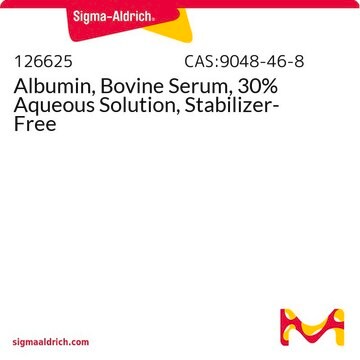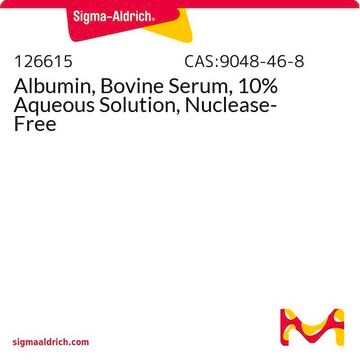126626
Bovine Serum Albumin
30% Sterile-Filtered Aqueous Solution, Preservative-Free
Synonym(s):
Albumin, Bovine Serum, 30% Sterile-Filtered Aqueous Solution, Preservative-Free
Sign Into View Organizational & Contract Pricing
All Photos(1)
About This Item
Recommended Products
product name
Albumin, Bovine Serum, 30% Sterile-Filtered Aqueous Solution, Preservative-Free,
Assay
≥96% (agarose gel electrophoresis)
form
liquid
manufacturer/tradename
Calbiochem®
storage condition
OK to freeze
color
pale amber
shipped in
ambient
storage temp.
2-8°C
General description
Albumin, Bovine Serum, 30% Sterile-Filtered Aqueous Solution, Preservative-Free is used as a stabilizing agent and carrier protein.
Bovine serum albumin (BSA) is an α-helical, non-glycosylated globular protein with 17-disulfide bonds. It is a member of the serum albumin family and has three domains with two sub-domains each.
Application
Albumin, Bovine Serum, 30% Sterile-Filtered Aqueous Solution, Preservative-Free has been used as a component of fluorescence-activated cell sorting (FACS) buffer to obtain a HaloTag CRISPR clone using FACS.
Biochem/physiol Actions
Bovine Serum Albumin (BSA) is a critical component of cell culture media. It is useful for embryonic stem cells (hESC) differentiation and helps to transport drugs, hormones, and fatty acids. BSA works as a blocking agent in enzyme-linked immunosorbent assay (ELISA).
Warning
Toxicity: Standard Handling (A)
Physical form
Supplied as a 30% sterile-filtered solution in water, preservative-free.
Legal Information
CALBIOCHEM is a registered trademark of Merck KGaA, Darmstadt, Germany
Storage Class Code
10 - Combustible liquids
WGK
WGK 3
Certificates of Analysis (COA)
Search for Certificates of Analysis (COA) by entering the products Lot/Batch Number. Lot and Batch Numbers can be found on a product’s label following the words ‘Lot’ or ‘Batch’.
Already Own This Product?
Find documentation for the products that you have recently purchased in the Document Library.
Customers Also Viewed
Elizabeth A Caine et al.
Current protocols in pharmacology, 91(1), e81-e81 (2020-12-18)
To assess the role of a protein, protein loss phenotypic studies can be used, most commonly through mutagenesis RNAi or CRISPR knockout. Such studies have been critical for the understanding of protein function and the identification of putative therapeutic targets
Casey A Thornton et al.
Nature communications, 12(1), 1274-1274 (2021-02-26)
High-throughput single-cell epigenomic assays can resolve cell type heterogeneity in complex tissues, however, spatial orientation is lost. Here, we present single-cell combinatorial indexing on Microbiopsies Assigned to Positions for the Assay for Transposase Accessible Chromatin, or sciMAP-ATAC, as a method
S Chodankar et al.
Physical review. E, Statistical, nonlinear, and soft matter physics, 77(3 Pt 1), 031901-031901 (2008-06-04)
Small-angle neutron scattering (SANS) and dynamic light scattering (DLS) have been used to study conformational changes in protein bovine serum albumin (BSA) due to perturbation in its native structure as induced by varying temperature and pressure, and in presence of
Yuhong Xiao et al.
Journal of immunological methods, 384(1-2), 148-151 (2012-06-27)
The enzyme-linked immunosorbent assay (ELISA) is an extremely common and powerful laboratory technique for detecting proteins by antibodies. Researchers frequently use bovine serum albumin (BSA) as a blocking agent to prevent non-specific binding of antigens and antibodies to the microtiter
Geoffrey L Francis
Cytotechnology, 62(1), 1-16 (2010-04-08)
Albumin has a long historical involvement in design of media for the successful culture of mammalian cells, in both the research and commercial fields. The potential application of albumins, bovine or human serum albumin, for cell culture is a by-product
Our team of scientists has experience in all areas of research including Life Science, Material Science, Chemical Synthesis, Chromatography, Analytical and many others.
Contact Technical Service




